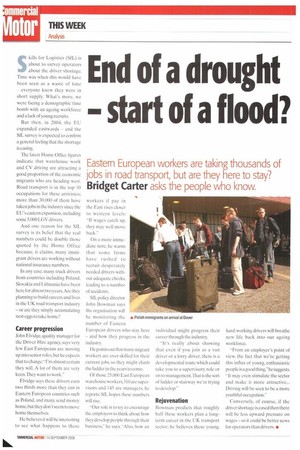End of a drought start of a flood?
Page 20

If you've noticed an error in this article please click here to report it so we can fix it.
Eastern European workers are taking thousands of jobs in road transport, but are they here to stay? Bridget Carter asks the people who know.
Skills for Logistics (SfL) is about to survey operators about the driver shortage. Time was when this would have been seen as a waste of time everyone knew they were in short supply. What's more, we were facing a demographic time bomb with an ageing workforce and a lack of young recruits.
But then, in 2004, the EU expanded eastwards and the SfL survey is expected to confirm a general feeling that the shortage is casing.
The latest Home Office figures indicate that warehouse work and CV driving are attracting a good proportion of the economic migrants who are heading west. Road transport is in the top 10 occupations for these arrivistes; more than 30,000 of them have taken jobs in the industry since the EU's eastern expansion, including some 5.0(X) LGV drivers.
And one reason for the SfL survey is its belief that the real numbers could be double those quoted by the Home Office because, it claims, many immigrant drivers are working without national insurance numbers.
In any case, many truck drivers from countries including Poland. Slovakia and Lithuania have been here for almost two years. Are they planning to build careers and lives in the UK road transport industry or are they simply accumulating nest eggs to take home?
Career progression
John Elvidge, quality manager for the Driver Hire agency, says very few East Europeans are moving up into senior roles, but he expects that to change:"I'm almost certain they will. A lot of them are very keen.They want to work."
Elvidge says these drivers earn Iwo thirds more than they can in Eastern European countries such as Poland, and many send money home, but they don't seem to move home themselves.
He believes it will be interesting to see what happens to these workers if pay in the East rises closer to western levels: If wages catch up, they may well move back."
On a more immediate note, he warns that some firms have rushed to recruit desperately needed drivers without adequate checks, leading to a number of accidents.
SfL policy director John Bowman says the organisation will be monitoring the number of Eastern European drivers who stay here and how they progress in the industry.
He points out that many migrant workers are over-skilled for their current jobs. so they might climb the ladder in the years to come.
Of those 25,000 East European warehouse workers,310 are supervisors and 145 are managers. he reports; SfL hopes these numbers will rise.
-Our role is to try to encourage the employers to think about how they develop people through their business." he says. -Also, how an individual might progress their career through the industry.
-It's really about showing that even if you join as a van driver or a lorry driver, there is a developmental route which could take you to a supervisory role or on to managementlhat is the sort of ladder or stairway we're trying to develop."
Rejuvenation
Bowman predicts that roughly half these workers plan a longterm career in the UK transport sector; he believes these young, hard-working drivers will breathe new life back into our ageing workforce.
"From an employer's point of view, the fact that we're getting this influx of young, enthusiastic people is a good thing," he suggests. "It may even stimulate the sector and make it more attractive... Driving will be seen to be a more youthful occupation."
Conversely, of course, if the driver shortage is eased then there will be less upward pressure on wages so it could be better news for operators than drivers. is
































































































































































































